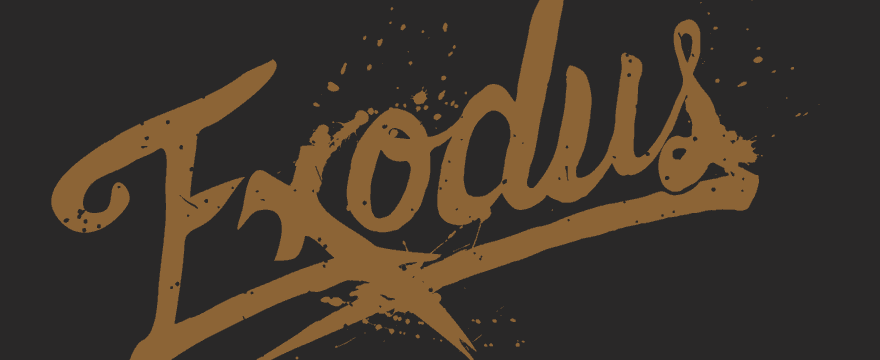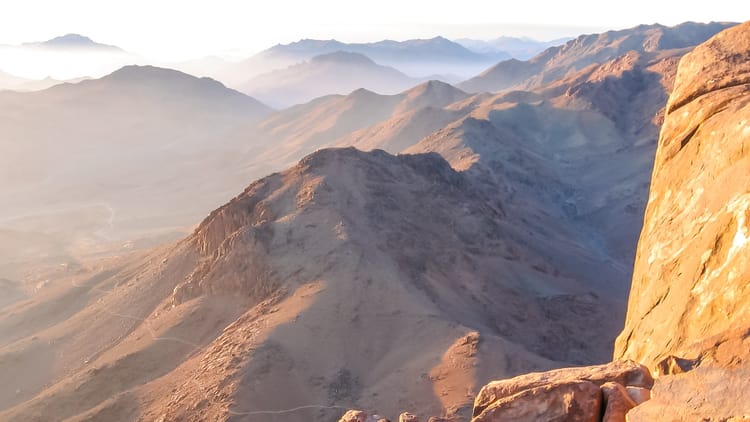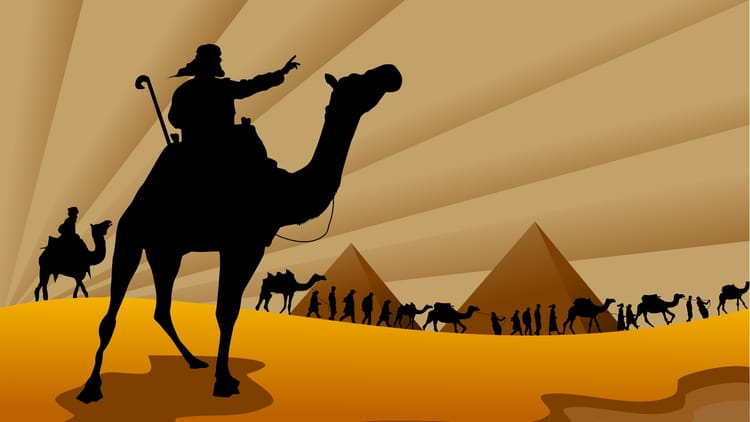The Greatest Rescue (Exodus 14:10-31)

Big Idea: We are born slaves to sin. Through his death and resurrection, Jesus can set you free to serve him.
It’s perhaps the greatest escape of history. It becomes the defining event of the Hebrew Scriptures, the Old Testament. By human reasoning, it never should have happened. A small but growing nation in captivity to the most powerful nation is set free after a series of miraculous events that show God’s power. Not only is this nation freed, but when the captors pursue them they’re miraculously drowned.
But it’s not just a great escape within history. It’s our story too.
If this story was simply about the release of Hebrew slaves, we probably wouldn’t be talking about it today on Easter Sunday. It’s also a significant event for us today. Today, Christians around the world are celebrating the resurrection of Jesus from the dead. On the Sunday after he was illegally executed, Jesus rose from the dead just as he said he would.
You see, the Bible speaks of Easter weekend as a second Exodus. In one of the most remarkable events of Jesus’ life, two of his closes disciples saw the veil removed that hid Jesus’ glory. We read:
And as he was praying, the appearance of his face was altered, and his clothing became dazzling white. And behold, two men were talking with him, Moses and Elijah… (Luke 9:29-30)
For a moment, a few of Jesus’ closest friends got to see Jesus’ eternal glory. Not only that, but they saw Jesus talking to Moses, who led Israel out of Egypt, and Elijah, the great prophet. And the text tells us what they were talking about: they “spoke of his departure, which he was about to accomplish at Jerusalem” (Luke 9:31). The word departure is exodus. They were referring to the coming events in Jerusalem — the death, resurrection, and later the ascension of Jesus — as a second exodus. Easter weekend brings the exodus story into our lives. It’s about our escape from slavery and our new freedom.
We all want freedom. We all love the theme of being set free so that we can enjoy freedom. So let’s look at the story of exodus and what it means for us today.
We’re going to see that we need an escape; how we get that escape; and what freedom is like when we’re set free.
Why We Need an Escape
For the past few weeks we’ve been looking at the story of Israel. We’ve seen that they are the recipient of God’s promises that he would make them into a great nation through which he would bless the world. We understand what this means. God promised that through the nation of Israel, Jesus would one day be born, and through his life the whole world would be delivered from sin.
But in the book of Exodus, things don’t look good at all. They’re in slavery, and things get worse and worse for them. But then God raises up a deliverer, but even then things get worse and worse. They have to work even harder with fewer resources. They’re being beaten. Life couldn’t get much worse for them than it was in Egypt.
What does this mean for us today? I don’t want to allegorize their story. It’s often dangerous to draw parallels between their story and ours — for instance, to compare their slavery to our situation today. But it is possible to pay attention to the themes that develop in Scripture, and one of those is slavery. We begin to discover that their slavery is a picture of the human condition: that we are slaves to sin.
For instance, Jesus spoke to a group of religious leaders once and promised them freedom. When they protested, saying that they had never been enslaved to anyone, Jesus responded:
Truly, truly, I say to you, everyone who practices sin is a slave to sin. The slave does not remain in the house forever; the son remains forever. So if the Son sets you free, you will be free indeed. (John 8:34-36)
The slavery of the Israelites in Egypt is a picture of our condition too.
For Jesus, then, the ultimate bondage is not enslavement to a political or economic system, but vicious slavery to moral failure, to rebellion against the God who has made us. The despotic master is not Caesar, but shameful self-centredness, an evil and enslaving devotion to created things at the expense of worship of the Creator. (D.A. Carson)
The Bible is blunt about our spiritual condition before Christ sets us free: we are slaves to sin. We think that we’re free, but that makes it even worse. A German poet once said, “None are more hopelessly enslaved than those who falsely believe they are free” (Johann Wolfgang von Goethe). The reality is that we think we’re free, but our experience tells us otherwise. What Paul writes in Romans 7 is frequently our experience too:
For I do not understand my own actions. For I do not do what I want, but I do the very thing I hate…So I find it to be a law that when I want to do right, evil lies close at hand. For I delight in the law of God, in my inner being, but I see in my members another law waging war against the law of my mind and making me captive to the law of sin that dwells in my members. (Romans 8:15, 21-23)
Hear his language: wanting to do right; doing the very opposite, the thing that he hates; a war within that takes him captive.
Carl Sandburg put it well: “There is an eagle in me that wants to soar, and there is a hippopotamus in me that wants to wallow in the mud.” Much of the time, the hippopotamus wins out.
There are many truths in Scripture that we may struggle to believe, but this shouldn’t be one of them. The truth is all around us. The philosopher Michael Ruse has written:
With respect to the main claims of Christianity … I am pretty atheistic …. I prefer the term 'skeptic' to describe my position …. I am an ardent evolutionist …. I think that science is the highest form of knowledge—I am a philosophical naturalist.
And yet, surprisingly, Ruse also ardently defends the biblical doctrine of original sin. Ruse argues:
I think Christianity is spot on about original sin—how could one think otherwise, when the world's most civilized and advanced people (the people of Beethoven, Goethe, Kant) embraced that slime-ball Hitler and participated in the Holocaust? I think Saint Paul and the great Christian philosophers had real insights into sin and freedom and responsibility, and I want to build on this rather than turn from it.
Our slavery to sin is one of the most demonstrable truths of Christianity.
Friends, this is why we need an escape. We don’t need to be a little bit better. We don’t need moral improvement. We’re in slavery, and we need escape.
This leads us to the second thing we need to see in this story:
How We Get That Escape
When you look at the exodus, you discover two things about it. You discover that God does it. And you discover that he does it decisively.
First, you discover that God did it. The Israelites never got together and plotted their escape. They couldn’t have. It was completely beyond them. They had no way to escape from Egypt, but God did it anyway.
This is why God says repeatedly throughout the Bible:
I am the LORD your God, who brought you out of the land of Egypt, out of the house of slavery. (Exodus 20:2)
But that’s not all. The way that God did this was decisive. You see this in the events that took place: God sending a series of plagues in Egypt until Pharaoh let them go, and then leading them to the Red Sea. You see God’s power as waters parted for Israel to pass through on dry ground, and then as the waters came back and drowned the Egyptian army as they pursued Israel. Israel didn’t save themselves; God did. It’s why the exodus account concludes:
Thus the LORD saved Israel that day from the hand of the Egyptians, and Israel saw the Egyptians dead on the seashore. Israel saw the great power that the LORD used against the Egyptians, so the people feared the LORD, and they believed in the LORD and in his servant Moses. (Exodus 14:30-31)
There’s another phrase that clues us in. In Exodus 15, Moses sings a song to celebrate what God did. He uses the phrase “God’s hand” some sixteen times. It underlines “the sole activity of the Lord in the great victory. The hand is the organ of personal intervention and action—God did it, and he alone” (Alec Motyer).
It’s the same way with us. The book of Exodus records the Passover, which took place the day before God set them free from Egypt. We saw last week that the Passover pointed to when Jesus would offer his life as a substitute for us. The Passover prefigures the death of Jesus. And in the same way, the passing through the waters of the Red Sea correspond to what happens to us when we trust in Christ.
Where do I get this from? 1 Corinthians says something baffling. He compares their passing through the Red Sea to baptism:
For I do not want you to be unaware, brothers, that our fathers were all under the cloud, and all passed through the sea, and all were baptized into Moses in the cloud and in the sea… (1 Corinthians 10:1-2)
What’s Paul doing here? He’s making a parallel between their escape from Egypt and what happens to us when we trust in Jesus. The Bible teaches that baptism is what people do when they put their faith in Jesus Christ. The outward sign of trust in Jesus Christ is baptism — which is why, by the way, we would love the privilege of baptizing you if you have trusted Jesus and have not yet been baptized as a believer. It would be our privilege to baptize you. And Paul says that when someone trusts in Christ, and is baptized, it’s a parallel experience to the Egyptians passing escaping from Egypt. We’ve been set free. We are people who were once in slavery but now have been set free because of the death and resurrection of Jesus.
On Good Friday we were slaves, under the authority of sin and facing divine judgment. On Easter morning we were a liberated people, free from sin, free from judgment. Christ passed through the waters of death on our behalf. So our baptism is the pledge and promise that we are liberated people on the eastern side of judgment. We walk through life with our judgment behind us.
Being a Christian means that there is a decisive moment in which we pass from death to life. It’s not a gradual thing. It’s immediate. The moment that someone trusts in Jesus, everything changes. “Therefore, if anyone is in Christ, he is ja new creation. The old has passed away; behold, the new has come” (2 Corinthians 5:17).
How do we get free from our slavery? There’s only one way: Jesus. God has acted decisively in the life of Jesus to set us free. He has done it all; we do nothing but receive what he has done for us and trust in his work. Jesus, lifted up the cross, buried, and risen again is our escape. It’s how we’re set free from the slavery that keeps us captive.
Do you want to be set free? Then look to Jesus today. And, if you want to be follow Scripture, get baptized too. I’d love to talk to you about how to do both. Don’t leave today in slavery. You can be set free, decisively, by trusting in the deliverance that Jesus accomplished for you on Easter so many years ago.
So far today we’ve seen why we need an escape, and we’ve seen how we can get that escape. There’s only one more thing that we need to see today.
What Life Is Like When We're Set Free
As we conclude this morning, I want to look at what life is like when we’ve been set free.
When Jesus promised freedom in John 8, this is what he said: “So if the Son sets you free, you will be free indeed” (John 8:36).
What does this freedom look like? It looks a little different than you might think. It’s not the freedom to do whatever you want. It is, instead, the freedom to serve a different master: Jesus. It’s the freedom to do what you were designed to do in the first place.
Israel was set free to serve God. We’re going to see in the coming weeks that God made a new covenant with them, a covenant that called them to joyful obedience. And our freedom in Christ is likewise a freedom to serve him. Galatians 5 says:
For you were called to freedom, brothers. Only do not use your freedom as an opportunity for the flesh, but through love serve one another. (Galatians 5:13)
Freedom isn’t getting to live however we want. Freedom is getting to live how God wants. It means being what we were meant to be. Real freedom is found in obedience and servanthood. It’s not so much that we have to; it’s that we get to serve God with all that we have.
It’s like the story from the Civil War days before America's slaves were freed, about a northerner who went to a slave auction and purchased a young slave girl. As they walked away from the auction, the man turned to the girl and told her, “You're free.”
With amazement she responded, “You mean, I'm free to do whatever I want?”
“Yes,” he said.
“And to say whatever I want to say?”
“Yes, anything.”
“And to be whatever I want to be?”
“Yep.”
“And even go wherever I want to go?”
“Yes,” he answered with a smile. “You're free to go wherever you'd like.”
She looked at him intently and replied, “Then I will go with you.”
We’re free — so there’s nothing better we could do than to serve the one who set us free.
As we’re going to learn in Exodus, and as we learn in the New Testament as well, we’re always in danger of losing our freedom. Surprisingly, the Israelites soon complained that they wanted to go back. That’s a danger we face as well. We’d sometimes rather be enslaved to sin than enjoy our newfound freedom in Jesus. Let’s never go back. Let’s grow in that freedom. Let’s never go back.
That’s the message of Easter. We are born slaves to sin. Through his death and resurrection, Jesus can set you free to serve him. That’s true freedom indeed.
That’s the meaning of Easter. When Jesus rose from the grave, he broke the shackles that bound us. Do you want to experience the freedom that Jesus offers? Come to him today. As surely as he led Israel to freedom, he will set you free today.





